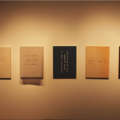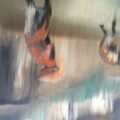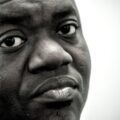Alain Mabanckou’s Broken Glass
The author of seven novels and six collections of poetry, Alain Mabanckou is already well known and celebrated across the Francophone world. His novels have been translated into more than fifteen languages, including Hebrew, Korean, Spanish, Catalan, and Norwegian. In 2006, he was awarded France’s prestigious Prix Renaudot for his novel Mémoires de por-épic (Memoirs of a Porcupine), a literary interpretation of a number of African folktales. He is widely acknowledged as one of the most important and decorated authors writing in French today.
Despite this international acclaim, though, Alain Mabanckou’s work has been slow to take hold in the United States. To date, only two of his novels have been published in English: African Psycho (Le Serpent à Plumes) and now, from Soft Skull Press, Broken Glass (Verre cassé), widely considered to be his greatest work of fiction to date. Mabanckou, a Congolese writer who moved to Paris at the age of twenty-two to pursue a career in law, has spoken extensively about the challenges of breaking into the literary establishment. He considers it one of the primary challenges that writers of his generation face—those born into independent Africa but whose work has yet to receive the kind of international attention and prestige enjoyed by those of the Parisian (or American) literary establishment. This first-world acceptance is also an issue at the heart of his larger literary project, which regularly explores the diversity of the Francophone world.
In an article by France Today, Mabanckou is quoted as saying: “For so many years, it [the literature of Francophone countries] has been disdained by the Paris establishment, relegated to small editions… The recent literary prizes awarded to French-speaking writers from other countries are a first step recognition, but that’s not enough. Francophone literature outside of France really has to be strong, because it’s one of the major ambassadors of the French language.”
This process seems to have begun, and Mabanckou is in good company in his mission. Jean-Marie Le Clézio, Mauritian author and president of the 2006 Prix Renaudot jury that awarded Mabanckou, won the Nobel Prize for Literature in 2008, drawing global attention to the world of Francophone literature. The English-language publication of Broken Glass, translated by Helen Stevenson, promises to keep the attention on this group of dynamic and innovative writers.
Broken Glass is narrated from the perspective of its title character, an ex-teacher with too great a love for Congolese palm wine. He now spends his days with the cast of characters who frequent the bar Credit Gone West. Stubborn Snail, the owner of the bar, has given former aspiring author Broken Glass a notebook in which to record the life and stories of his bar. This task is not particularly challenging. The diverse group that frequents Credit Gone West is all too eager to share their stories of heartbreak, ruin, and destruction as soon as they learn of the project. These stories, recorded and interpreted by Broken Glass, fill most of the novel and stand alongside their author’s musings on his own life and the community he now inhabits.
Among this crowd is the Printer, a Congolese man who boasts that he has “done Europe.” Like many characters in the novel, the Printer confidently assures Broken Glass that his story is essential to the success of the project: “if you don’t put me into your book, it won’t be worth the paper it’s written on.” His story, recorded through the narrative lens of Broken Glass, takes the reader to Paris, where the Printer was a respectable worker with a supervisory position in a printing factory on the outskirts of the city. Here, in a nightclub, the Printer meets Céline, the voluptuous white woman who spells his downfall. The two marry and establish themselves in a neighborhood outside Paris because, as the Printer says, “we wanted a pleasant life, and above all a life well away from negroes.” Despite his preference, the Printer is anxious to demonstrate the failings of the Black community in Paris, and repeatedly insists that he is not a racist.
A few years into their marriage, it is revealed that the Printer once had a son with a West Indian woman whom he met while he was studying at the Centre National des Arts et Métiers. The son, now a teenager, comes to live with the family, and one day the Printer, who has suspected his wife of infidelity, discovers them “all tangled up in the poor Christ of Bomba position.” The Printer flies into a rage of jealousy and betrayal, and is summarily arrested. In a plot point fairly common to these men’s stories, Céline testifies against him. She persuades the police that the incest in question was actually between the Printer and their two young daughters. The Printer is institutionalized and, eventually, deported back to Africa, at which point he takes up the drink and suffers himself to the constant company of the Black community he had grown to despise as a young man in Paris.
The figure of the devious, cruel, unfaithful femme fatale is a running motif through many of the stories recorded in Broken Glass’ notebook, including his own ex-wife Angelica (renamed Diabolica). In fact, though Broken Glass ruminates regularly on his sex life (or lack thereof, since his wife kicked him out), there seem to be almost no females present in Credit Gone West. The vast majority of the reader’s knowledge of these women in this community arrives through stories like that of the Printer and Broken Glass; stories which unfailingly portray the women who have entered these men’s lives as plagues on their productivity, respectability, and happiness.
The rare exception to this all-male community is Robinette, a “juicy mouthful” of a woman who out-weighs, out-drinks, and, most significantly, out-pisses the loyal male patrons of Credit Gone West. Robinette’s extraordinary urinary prowess is demonstrated in the one story Broken Glass recounts without coercion from its main character. It recounts Robinette’s wager with a particularly arrogant patron in the bar: “hey, you there, strutting about like a barnyard cock, if you can piss longer than me I’ll let you shag me, any time, any place, free of charge, I give you my word.” Robinette loses her own bet when this man is revealed to be a urinary artist; he easily wins the contest and, in the meantime, sketches “with his urine a perfect outline of the map of France.”
This passage is indicative of the novel’s irreverent style and reveals Mabanckou as the rare kind of writer who can incorporate high literary allusions as well as bawdy humor. Mabanckou draws heavily on his predecessors as he pursues this project, and it is perhaps one of the most notable characteristics of Broken Glass that it is absolutely littered with literary allusions. French writers from Rimbaud to Chateaubriand find good representation in the pages of Broken Glass. These references, which also encompass a full range of world literature, are rarely more than passing allusions, as demonstrated in a particularly loaded passage that brings to light the sheer diversity of writers referenced in Mabanckou’s work:
yes, I really must go, and travel northwards, and experience the highest solitude, see the diverted river, and live in the big house filled with the light of an African summer, and leave this continent, to discover other hot countries, and live one hundred years of solitude, adventures and discovery in a village called Macondo, fall under the spell of a character called Melquides, and listen entranced to tales of love, madness, and death… I must cast my net across the entire continent of Europe, so dear to our friend the Printer, I the outsider, the rebel, the approximate man, I was just behind a guy called Doctor Zhivago who walked through the snow
In some ways, Mabanckou’s novel suffers from this cursory coverage of the canon of world literature from Marquez to Joyce to Tzara and Pasternak, but the sampling of authors also reveals the depth and breadth of Mabanckou’s engagement with writers from across the world. Many of the authors he references, even only in passing, are those who have tackled the challenges of constructing a literary national narrative before him.
Like the varied stories that come together to form the narrative of Broken Glass, these allusions also form the tapestry of Mabanckou’s style and his literary project. He not only mentions but also incorporates the techniques of his well-referenced authors. Broken Glassexhibits the bawdiness of Rimbaud, the humor of Joyce, and the punctuation of Saramago, among others—it’s incredibly rare to find a distinguished literary writer exhibit the kind of humor and irreverence that Mabanckou does, and this is part of what has made him so popular and widely read in the Francophone world. His work is, in this sense, perhaps best compared to the Joyce of Ulysses and Finnegans Wake, blending irreverence, humor, incisive national critique, and literary innovation together in one text.
Yet, although Mabanckou may well be worthy of the increasing critical attention he receives, this novel does not herald a writer likely to take the place of Joyce. Broken Glassis a fast and enjoyable read, particularly for those who relish in his particular brand of literary pun, but many of his stylistic innovations are inconsistent and occasionally fall flat.
The entirety of the novel is written, as acknowledged in the text, with “no full stops, only commas and more commas.” This narrative technique reflects the lives of the men it records in its uneven texture and lack of structure, but it too often succumbs to disarray. The style draws conspicuous attention to itself, distracting from the lyrical qualities of Mabanckou’s narrative. Of course, it is difficult to ascertain how much of this may be due to the challenges of translation. In many instances, the endless stream of commas make grammatical sense (even if they would be mangled by any traditional proofreader), but the text regularly indicates clear breaks in thought and narrative that appear to be willfully marked by commas rather than periods.
When Stubborn Snail first looks at Broken Glass’ work, he comments, “I think you should tidy it up a bit, don’t you, how am is supposed to read all that, if it’s all run together like that, you need to leave some spaces, a few breathing places, some pauses, don’t you see, I really expected better of you.” Mabanckou’s insistence on this grammatical technique leaves the reader little opportunity to breathe (particularly in a novel of only 165 pages). This means that the reader sometimes glosses over significant portions of the novel as she stumbles through the language. In the least successful passages, the style is just distracting.
But Mabanckou is redeemed by the self-conscious literariness and irreverence of his writing. Readers may find themselves frustrated, as Stubborn Snail is, with the lack of breathing spaces in Broken Glass, but they are likely to find themselves amused at the many ironies of Broken Glass, who recalls receiving a letter from government officials and spending “a whole day correcting the grammatical and syntactical errors in it.” Mabanckou’s love of language is evident, as is his restlessness in the face of his literary forebears and his desire to carve out a space for unacknowledged societies.
Early in the novel, Broken Glass records Stubborn Snail’s intentions in giving him he notebook: “he said he didn’t want Credit Gone West just to vanish one day, and added that people in this country have no sense of the importance of memory that the days when grandmothers reminisced from their deathbeds was now gone. . .” Other reviewers, and the publisher themselves, have picked up on this quote and argued that this is a novel about the challenges of memory in a nation that has chosen to forget. But this is perhaps not entirely accurate, given the jockeying that goes on for a mention in Broken Glass’ book. All the inhabitants of Credit Gone West are, in fact, obsessed with the stories of their past — both their glories and the extreme failures that led them to live out their old age in the bar. They have hardly forgotten, at least on a personal level. In this way, Broken Glass is not exactly a novel of memory. It is a novel about the way we understand and mediate our collective histories, especially the histories of those who fall outside of mainstream national narratives.
For Mabanckou, this has national, personal, and literary importance. In an interview with Kenyan writer Binyavanga Wainaina for Bomb Magazine, Mabanckou recounts his early experiences with the French language:
First of all, I learned French when I was six. This means that before six I was speaking five or six African languages: Bembé, Lingala, Laari, Munukutuba, Vili, Kamba. I was shocked to see later on that there was no literature in these languages. Nothing is written in Bembé or in Lingala—they’re oral languages. When I was in high school, we first read Anglophone literature. We read Chinua Achebe and Ngugi Wa Thiong’o in an anthology for us in the Francophone world to understand what people from Nigeria, Ghana, and Kenya were writing in English. So I discovered that in Kenya, for instance, you can have great literature in Kikuyu and Swahili. I was frustrated that that was not the case for Congo: my practice of literature is still in the colonial language. I cannot express something directly to my people…
In Broken Glass, this oral tradition is brought to bear on the stories of this collection of Congolese riffraff, and marvelously so. The most difficult challenge to entering the literary establishment lies in opening the world to these kinds of stories, told in the meandering language of an alcoholic ex-teacher and ambitious literateur. Toward the end of the novel, speaking to a Credit Gone West regular—an old man now forced to wear four thick layers of Pampers after time in a Congolese prison–Broken Glass says, “life lies all before us, you know, even if your wife has behaved badly and even if she’s still fornicating with the guru from that damned sect, life all lies before us.”
About Katherine Evans
Katherine Evans Pritchard is a contributing editor and PhD candidate in American Studies at Boston University.





